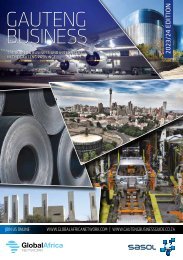Service - Leadership in Government - Issue 75
You also want an ePaper? Increase the reach of your titles
YUMPU automatically turns print PDFs into web optimized ePapers that Google loves.
S<br />
energy<br />
Indications show that climate and energy will be essential<br />
topics for governments, bus<strong>in</strong>esses and consumers alike.<br />
The emerg<strong>in</strong>g energy-sector stakeholders’ decisions<br />
provide positive signs for a long-term acceleration of<br />
the energy transition, reveal<strong>in</strong>g new ways of f<strong>in</strong>anc<strong>in</strong>g,<br />
produc<strong>in</strong>g and consum<strong>in</strong>g energy. Six macro-trends <strong>in</strong><br />
three areas characterise the impact.<br />
If consumers or regulators start mak<strong>in</strong>g<br />
decisions about what they buy based<br />
on the overall carbon impact, entire<br />
value cha<strong>in</strong>s will be quickly impacted.<br />
FINANCE: Grow<strong>in</strong>g <strong>in</strong>terest <strong>in</strong> low-carbon assets.<br />
A complex issue is that socio-economic pressures are<br />
chang<strong>in</strong>g the way markets prioritise their <strong>in</strong>vestments.<br />
<strong>Government</strong>s and <strong>in</strong>dustries alike are <strong>in</strong>corporat<strong>in</strong>g<br />
environmental commitments <strong>in</strong>to their long-term plans<br />
for an economic recovery. The International Monetary<br />
Fund has urged governments to tie post-Covid stimulus<br />
packages to their climate goals, promot<strong>in</strong>g emergency<br />
loans for green technology and scrapp<strong>in</strong>g fossil fuel<br />
subsidies. Consequently, <strong>in</strong>vestors are shift<strong>in</strong>g away from<br />
traditional <strong>in</strong>vestments <strong>in</strong> favour of low-carbon assets.<br />
As <strong>in</strong>vestors seek long-term stability dur<strong>in</strong>g the<br />
volatility, prelim<strong>in</strong>ary signs <strong>in</strong>dicate that Covid-19<br />
could be a galvanis<strong>in</strong>g force for energy transition<br />
<strong>in</strong>frastructure <strong>in</strong>vestments <strong>in</strong> the long term. Capital<strong>in</strong>tensive<br />
generation and <strong>in</strong>frastructure categories could<br />
capture a larger share of the <strong>in</strong>vestment wallet.<br />
PRODUCE: A power mix transformation makes strategic<br />
sense. As recovery plans re<strong>in</strong>force long-term support for<br />
the energy transition, the magnify<strong>in</strong>g lens hovers over<br />
commitments to reduce Scope 3 emissions, which cover all<br />
direct and <strong>in</strong>direct emissions from sources that a company<br />
does not own or control, such as transportation, use of sold<br />
products, and end-of-life product treatment. The lifetime<br />
carbon impact of products and services is now com<strong>in</strong>g to<br />
light. If consumers or regulators start mak<strong>in</strong>g decisions<br />
about what they buy based on the overall carbon impact,<br />
entire value cha<strong>in</strong>s will be quickly impacted.<br />
CONSUME: Consumer behaviour changes are driv<strong>in</strong>g<br />
product demand shifts and decarbonisation – the pace<br />
and nature of these changes vary by country and city.<br />
Covid-19 has triggered large-scale changes that should<br />
permanently impact urbanisation models. Over 85%<br />
of organisations encourage or mandate employees to<br />
work from home. Road traffic <strong>in</strong> major cities around<br />
the world has plummeted by more than 40%. As more<br />
work has gone virtual, digital collaboration tools have<br />
enjoyed a major popularity surge. For example, on<br />
31 March 2020, Microsoft Teams set a daily record of<br />
2.7-billion meet<strong>in</strong>g m<strong>in</strong>utes – 200% higher than the week<br />
before. Global companies are say<strong>in</strong>g that these remote<br />
ways of work<strong>in</strong>g will be the new normal. Twitter CEO<br />
Jack Dorsey announced that its employees will work<br />
from home forever, and Barclays CEO Jes Staley expects<br />
Covid-19 to make big offices a th<strong>in</strong>g of the past.<br />
<strong>Government</strong>s are adapt<strong>in</strong>g mobility regulations<br />
<strong>in</strong> some cities to become more efficient and reduce<br />
pollution. The UK has accelerated its trial launch of<br />
e-scooters to alleviate pressure on public travel modes<br />
without <strong>in</strong>creas<strong>in</strong>g carbon emissions. London mayor,<br />
Sadiq Khan, announced “one of the biggest car-free<br />
<strong>in</strong>itiatives of any city <strong>in</strong> the world” <strong>in</strong> a pedestrianisation<br />
campaign of certa<strong>in</strong> city roads. Paris’ mayor revised the<br />
city’s street map dur<strong>in</strong>g the lockdown, dedicat<strong>in</strong>g paths<br />
on some roads for bicycles and clos<strong>in</strong>g traffic on major<br />
routes such as Rue de Rivoli (near the Louvre Museum).<br />
Consumer sentiment is often the most poorly<br />
understood driver of change, yet it has the potential<br />
to rapidly shift a market, product demand and/or its<br />
supply cha<strong>in</strong>s. The pandemic behavioural shifts reveal<br />
the power of consumers. Where energy transition<br />
trends have typically been catalysed by regulation<br />
and technology, consumers will likely become a major<br />
<strong>in</strong>fluence. This is not a new phenomenon: the “Blue<br />
Planet effect” ignited a global war on plastic, and the<br />
ensu<strong>in</strong>g rapid-fire regulatory, operational and product<br />
changes required supply cha<strong>in</strong>s and logistics to rapidly<br />
pivot. With consumers lead<strong>in</strong>g this push, some markets<br />
have struggled to keep up, creat<strong>in</strong>g an impact on both<br />
top and bottom l<strong>in</strong>e.<br />
HOW SHOULD COMPANIES RESPOND?<br />
Never let a crisis go to waste. Currently, most bus<strong>in</strong>esses<br />
are focused on survival. When Covid-19 cases start<br />
dissipat<strong>in</strong>g, leaders must prepare for what comes next:<br />
to adapt to the new normal and become agile enough<br />
to respond to future trends – build<strong>in</strong>g bus<strong>in</strong>ess models,<br />
products and services fit for an energy transition future.<br />
Tailor a global strategy to local conditions. Transition<br />
enablers are well-known: switch<strong>in</strong>g from high- to<br />
low-emission generation, electrify<strong>in</strong>g applications,<br />
develop<strong>in</strong>g multiple forms of storage and improv<strong>in</strong>g<br />
energy efficiency. This shift will not occur uniformly<br />
across the globe, as a multitude of local factors is <strong>in</strong> play.<br />
Technology is borderless; adoption is local. Strategy<br />
must take <strong>in</strong>to account at least four dimensions: regulation,<br />
technology economics, technology constra<strong>in</strong>ts and<br />
consumers’ acceptance and demand. When reassess<strong>in</strong>g<br />
and prioritis<strong>in</strong>g <strong>in</strong> the wake of Covid-19, local market<br />
conditions may have changed – creat<strong>in</strong>g both threats<br />
and opportunities that need to be re-exam<strong>in</strong>ed. In mak<strong>in</strong>g<br />
decisions, it is crucial to take an end-to-end view on the<br />
___ __<br />
The coronavirus has<br />
triggered large-scale<br />
changes that should<br />
permanently impact<br />
urbanisation models.<br />
10 | <strong>Service</strong> magaz<strong>in</strong>e


















